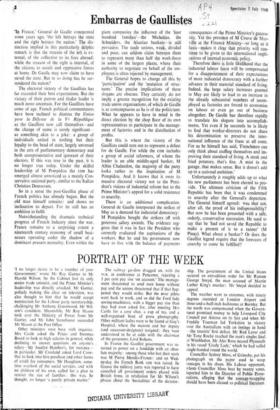Embarras de Gaullistes 51,,
France,' General de Gaulle commented some years ago, 'the left betrays the state and the right betrays the nation.' The dis- tinction implied in this particularly delphic remark is that the treason of the left is ex- ternal, of the collective to its foes abroad; while the treason of the right is internal, of the citizens to occult and oppressive forces at home. De Gaulle may now claim to have saved the state. But in so doing has he sur- rendered the nation?
The electoral victory of the Gaullists has far exceeded their best expectations. But the victory of their patron and titular leader is much more uncertain. For the Gaullists have come of age. French political commentators have been inclined to dismiss the Union pour la Defense de la Ve Republique as the Gaullists now call themselves—and the change of name is surely significant— as something akin to a joke: a group of individuals united in nothing but their loyalty to the head of state, largely unversed in the arts of parliamentary democracy and both unrepresentative and ignorant of their electors. If this was true in the past, it is no longer true today. Under the skilful leadership of M Pompidou the UDR has emerged almost unnoticed as a mainly Con- servative national party, similar to the Italian Christian Democrats.
So in a sense the post-Gaullist phase of French politics has already begun. But the old man himself remains: and shows no inclination to depart. For he still has an ambition to fulfil.
Notwithstanding the dramatic technical progress of French industry since the war, France remains to a surprising extent a nineteenth century economy of small busi- nesses operating under the shadow of a dominant peasant mentality. Even within the giant companies the influence of the 'four hundred families'—the Michelins, the Schneiders, the Alsatian bankers—is still pervasive. The trade unions, weak, divided and poor, can seldom claim between them to represent more than half the work-force in some of the largest plants, where their authority to negotiate on behalf of the em- ployees is often rejected by management.
The General hopes to change all this by `participation' and the 'mutation of struc- tures.' The precise implications of these slogans are obscure. They certainly do not imply a greater recognition for the existing trade union organisations, of which de Gaulle is as contemptuous as he is of the politicians. What he appears to have in mind is the direct election by the shop floor of its own representatives to participate in the manage- ment of factories and in the distribution of profits.
But this is where the victory of the Gaullists could turn out to represent a defeat for de Gaulle. For while the UDR includes a group of social reformers, of whom the leader is an able middle-aged banker, M Albin Chalandon, the majority of the party looks rather to the inspiration of M Pompidou. And it knows that it owes its massive electoral victory not to the Presi- dent's visions of industrial reform but to the Prime Minister's appeal for a solid resistance to anarchy.
There is an additional complication. General de Gaulle interpreted the strikes of May as a demand for industrial democracy : M Pompidou bought the strikers off with generous salary awards. The evidence sug- gests that it was in fact the President who correctly evaluated the aspirations of the workers. But be and his government now have to live with the balance of payments consequences of the Prime Minister's genero- sity. Yet the presence of M Couve de Mur- ville at the Finance Ministry—so long as it lasts—makes it clear that priority will con- tinue to be given to the international impli- cations of internal economic policy.
Therefore there is little likelihood that the industrial labour force will be compensated for a disappointment of their expectations of more industrial democracy with a further advance in their material standard of living. Indeed, the large salary increases granted in May are likely to lead to an increase in the already substantial numbers of unem- ployed as factories are forced to economise on labour or even go out of business altogether. De Gaulle has therefore rapidly to translate his slogans into accomplish- ments. Yet even if he succeeds he is likely to find that worker-directors do not share his determination to preserve the inter- national influence of the franc at all costs. For as he himself has said, 'Frenchmen can only think about stuffing themselves and im- proving their standard of living. A steak and fried potatoes, that's fine. A mini in the garage, that makes sense. But it doesn't add up to a national ambition.'
Unfortunately it roughly adds up to what his new parliament has been elected to pro- vide. The ultimate criticism of the Fifth Republic has been that it was condemned to anarchy after the General's departure. The General himself agreed: was that not, after all, the proof of his indispensability? But now he has been presented with a safe, orderly, conservative succession. He used to say that he `had not saved the Republic to make a present of it to a tanner' (M Pinay). What about a banker? Or does the Gaullist legend require that the forecasts of anarchy to come be fulfilled?










































 Previous page
Previous page